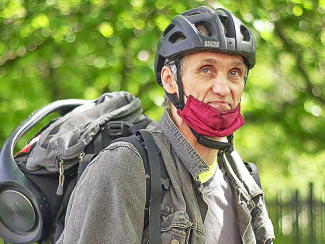STAYIN’ ALIVE
'Binners': one more good reason to make cities more bike-friendly

'Binner' Steve Nelson, former bike courier and champion mountain biker
STEVE NELSON MAY BE DOWN but he’s not out. He’s a survivor—a twenty-first century hunter/gatherer roaming the back streets and alleys in Vancouver. “Binning” and stayin’ alive.
Binning is scavenging for recyclable materials to sell. “Binners” are bikers. They depend on their bikes to patrol their “trap lines” to gather up cans and metal scraps in neighbourhoods all over Vancouver. Steve says binning is booming.
Recycling ‘trap lines’
Steve was once a bike courier and champion mountain biker. He has a heart condition now, and tendinitis in his left foot, but that doesn’t keep him from his work tending his trap line. “I can ride my bike a hundred miles a day, but I can only walk a couple blocks before I start crippling up,” he says.
Binners may be recyclers, but they don’t ride bikes out of concern for the environment. They ride bikes because it lets them get around to more places more often, without aggravating their health issues.
Cycling also lets them get to out of the way locations, like back alleys, and carry their bulky bags filled with recyclables.
Steve has a few special bags for binning, much more durable than garbage bags. They are recycled laundry bags a friend of Steve’s scavenged for him from a bin behind a hospital.
An underground bicycle economy
Binners rely on the friendly support of community bike shops and the Four Directions Trading Post to offer low cost ways to fix their bikes and purchase new ones when their old ones are stolen.
A community bike shop offered Pete, also a binner, credit for a new tube, allowing him to pay them back when he was able to. “When you get your cheque, you can square up with them,” he said. “[It] kept me on the road for quite a while.”
All the binners prefer to sell to recycling depots outside of the downtown core. Cycling the extra distance is worth it because the depot operators are friendly, pay more, and offer perks like free coffee and heaters.
But getting there can be a challenge: for example, to get to one bottle depot, Steve has to ride over an overpass on a sidewalk in the wrong direction.
Treated like criminals
Despite riding for long hours and diverting significant amounts of waste from the landfill on a daily basis, binners are not often praised for their efforts. In fact, they are all routinely stigmatized by police and other road users.
They are often pulled over for relatively minor infractions, such as not wearing a helmet, not having lights after dark and cycling on the sidewalk—something the city’s infrastructure often makes necessary on their routes.
Steve says that he was instantly coded as a criminal when recycling. “A lot of them, cops and regular people, they instantly think of you as a criminal. Pickin’ up empties? You’re a criminal.”
But, it all comes with the territory, says Steve. He reports the pandemic had no bad effects for him. “I’ve made 30 bucks some nights in just 15 minutes riding seven blocks home,” he said.
Just stayin’ alive.
- 30 -













Add new comment